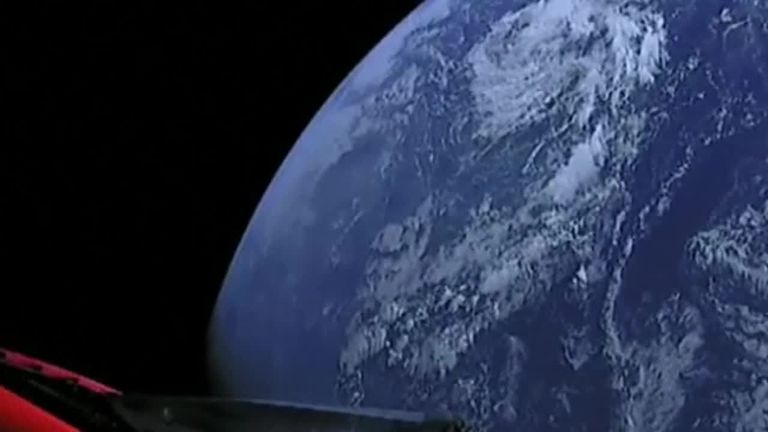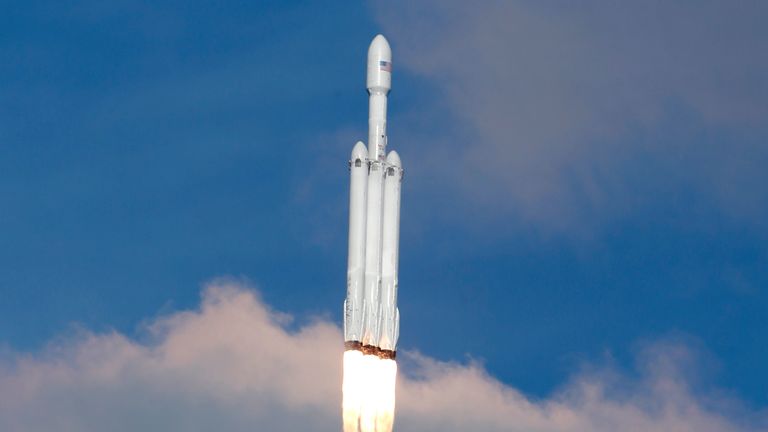Who's winning battle of space race billionaires?

Friday 9 February 2018 16:08, UK
Bethany Minelle, News Reporter
In 1969 man first set foot on the Moon - and our obsession with interplanetary travel has continued ever since.
But rather than world powers fighting it out in a bid to prove their technological prowess, the modern space race is being contested by people who head up multi-billion dollar companies.
Sky News takes a look at the three men at the forefront of galactic exploration.
Elon Musk, SpaceX
"I want to die on Mars… just not on impact"
Profile: South African born billionaire Elon Musk founded SpaceX in 2002.
The 46-year-old serial entrepreneur owns electric vehicle manufacturer Tesla and is also developing a high-speed transport system called Hyperloop.
The goal: Musk's ultimate goal is to establish a colony on Mars. He hopes that by colonising the red planet we can "reduce the risk of human extinction".
The first cargo mission is pencilled in for 2022, with a crewed mission two years later.
USP: Mars is Musk's thing: a trip to the red planet with SpaceX could one day set you back $200,000 (£140,000) per person.
The money: The company generates revenue by running cargo missions for NASA to the International Space Station.
What have they achieved? Its Falcon Heavy rocket - the world's most powerful - successfully launched from Cape Canaveral on 7 February. Musk blasted his Tesla Roadster into space as the test payload.
The rocket's five million pounds of thrust can carry a payload of 64 tons - twice that of its nearest rival - and is far cheaper thanks to its reusable boosters that land themselves upright back on Earth.
It has been booked to launch several large communications satellites and has also completed classified launches for the US government.
There have been setbacks, however - notably a launchpad explosion in 2016 that destroyed a $200m satellite.
:: Falcon Heavy is a space race game-changer
The next step: SpaceX was planning to send two paying passengers around the Moon by the end of the year - but there are reports that date might be pushed back.
His 108-metre BFR (Big F* Rocket) is also in the works as a replacement for the Falcon series.
As well as heading into space, Musk says it may also one day be used as a worldwide 'commuter' rocket - whisking people from one side of the world to another in about half an hour.
Jeff Bezos, Blue Origin
"We need a space-faring civilisation"
Profile: Amazon boss Jeff Bezos - the world's richest man - set up his spaceflight company, Blue Origin, in 2000.
The goal: The company is developing its own reusable heavy-lift rocket - New Glenn - which it says is "a major step toward… millions of people living and working in space".
The hope is that the 99-metre rocket will lower space-flight costs and make private human space travel more reliable.
Its seven engines will pump out 3.85 million pounds of thrust and lift 45 tons into orbit.
New Glenn's first launch is expected from Florida within the next two years.
USP: Blue Origin's motto is "Gradatim Ferociter", meaning "step by step ferociously", and it has initially focused on developing suborbital flights for paying passengers - who will get a taste of weightlessness in an 11-minute flight.
The missions will use its smaller New Shepard rocket - made up of a crew capsule on a reusable rocket booster.
The money: Bezos used some of his own e-commerce riches to fund Blue Origin.
Last year he revealed he was selling $1bn a year of Amazon stock to finance his space ambitions.
What have they achieved? The company has already made a number of successful suborbital flights from Texas using the New Shepard.
Its last flight in December 2017 featured a test dummy called Mannequin Skywalker - but a human has yet to take a ride.
The next step: The first paying passengers could blast to the edge of space on New Shepard next year. The cost of tickets has not yet been revealed.
Richard Branson, Virgin Galactic
"Space is hard - but worth it"
Profile: British entrepreneur Richard Branson set up the world's first commercial spaceline - Virgin Galactic - in 2004.
The 67-year-old - who was knighted in 2000 for "services to entrepreneurship" - is also the founder of the Virgin Group which controls more than 400 companies.
The goal: "To become the spaceline for Earth - democratising access to space for the benefit of life on Earth."
USP: Sticking to what he knows, Branson wants to fly a plane - SpaceShipTwo - rather than a traditional rocket into space.
The money: Last year Saudi Arabia injected around $1bn (£760m) into Virgin Galactic and Virgin Orbit. Virgin still remains the majority shareholder.
What have they achieved? Test flights have taken place, successfully reaching the 50 miles (80km) altitude necessary to test airflow and performance in the cold temperatures of the upper atmosphere.
The company has been regrouping for the last few years, following a 2014 test flight over California which exploded, killing the co-pilot.
The next step: In October, Branson wrote on his website: "We are now just months away from Virgin Galactic sending people into space and Virgin Orbit placing satellites around the Earth."
This is good news for the 700 people who have already bought tickets costing $250,000 each. Justin Bieber, Brad Pitt and Lady Gaga are already on the list.
So far only 560 people have been to space, but as business leaders compete to commercialise space travel, popping to space in our lifetime is becoming an increasingly realistic prospect.
May the best (space)man win.








